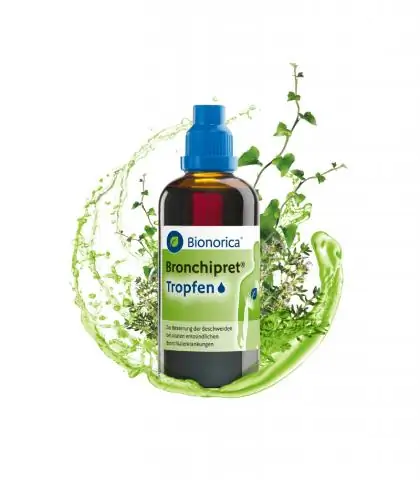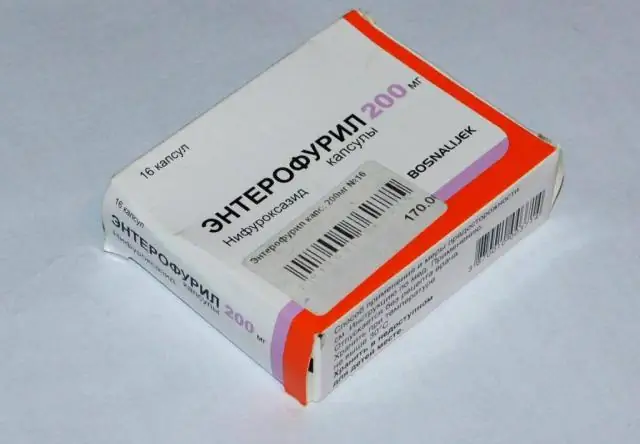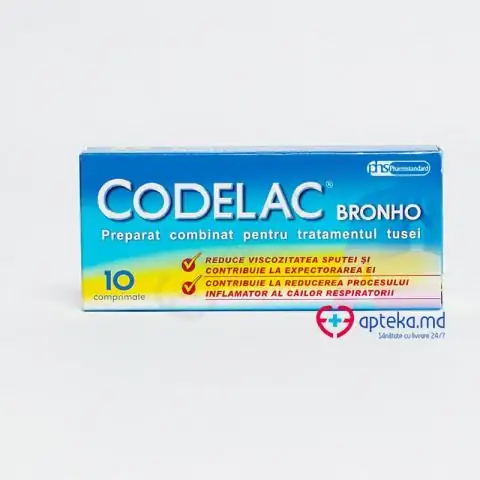- Author Rachel Wainwright wainwright@abchealthonline.com.
- Public 2023-12-15 07:39.
- Last modified 2025-11-02 20:14.
Tsevikap
Tsevikap: instructions for use and reviews
- 1. Release form and composition
- 2. Pharmacological properties
- 3. Indications for use
- 4. Contraindications
- 5. Method of application and dosage
- 6. Side effects
- 7. Overdose
- 8. Special instructions
- 9. Application during pregnancy and lactation
- 10. Use in childhood
- 11. In case of impaired renal function
- 12. Drug interactions
- 13. Analogs
- 14. Terms and conditions of storage
- 15. Terms of dispensing from pharmacies
- 16. Reviews
- 17. Price in pharmacies
Latin name: Cevikap
ATX code: A11GA01
Active ingredient: ascorbic acid (Ascorbic acid)
Producer: JSC "Medana Pharma" (Medana Pharma, SA) (Poland)
Description and photo update: 2020-25-03

Cevicap is a vitamin preparation containing ascorbic acid.
Release form and composition
The drug is available in the form of drops for oral administration: colorless or light yellow liquid, transparent (10 ml or 30 ml in glass vials of dark color, equipped with a dropper stopper, in a cardboard box 1 bottle and instructions for the use of Tsevikap).
1 ml of drops contains:
- active substance: ascorbic acid - 100 mg;
- auxiliary components: glycerol, disodium edetate, purified water.
Pharmacological properties
Pharmacodynamics
Cevicap is a vitamin preparation in the form of drops, the active ingredient of which is ascorbic acid (vitamin C).
The therapeutic effect of the drug is due to such properties of ascorbic acid, such as strengthening the immune system, a positive effect on the absorption of iron, potentiation of detoxification processes. In addition, vitamin C is involved in the metabolism of cholesterol and in many other metabolic reactions, including the conversion of folic acid to its active form - folinic acid; helps to prevent peroxidation processes.
Due to the participation of ascorbic acid in the biosynthesis of collagen, proteoglycans and elastin, as well as in the formation of connective tissue, integration and support of the intracellular structure of all body tissues occurs. Collagen is the main building block of connective tissue. It makes up 30-40% of body proteins, is a part of the endothelium of blood vessels, skin, ligaments and tendons, bones, cornea, teeth, intercellular substance. Lack of collagen negatively affects the healing processes of wounds and skin lesions of various etiologies (diaper rash), fusion of cracks and bone fractures.
Pharmacokinetics
After oral administration, ascorbic acid is actively absorbed from the digestive tract.
Plasma protein binding is approximately 25%.
From the blood it quickly penetrates into almost all tissues and biological fluids, including breast milk, crosses the placental barrier.
The concentration level of vitamin C in 100 ml of blood plasma of a healthy person ranges from 0.8 to 1.5 mg.
As a result of the reversible oxidation of ascorbic acid, dehydroascorbic acid is formed, which is partially biotransformed into ascorbate-2-sulfate and oxalic acid.
It is excreted from the body through the kidneys. The excretion of ascorbic acid is controlled by the renal threshold, which is 1.5 mg / 100 ml. When higher doses are taken, vitamin C is rapidly excreted by the kidneys unchanged.
Indications for use
In order to increase the body's resistance, the use of Cevicap is indicated as part of the complex therapy of the following conditions, accompanied by an increased need for vitamin C:
- colds;
- upper respiratory tract infections;
- the period of convalescence.
In addition, Tsevikap drops are recommended to be taken to prevent vitamin C deficiency in case of unbalanced or inadequate nutrition, including the diet of formula-fed infants.
Contraindications
Absolute:
- the use of high doses in patients with hypercoagulability, thrombophlebitis, a tendency to thrombosis;
- kidney stone disease;
- diabetes;
- deficiency of glucose-6-phosphate dehydrogenase;
- hypersensitivity to the components of the vitamin preparation.
Tsevikap should be taken with caution in renal failure, hemochromatosis, thalassemia, hyperoxaluria (oxalosis), polycythemia, leukemia, sickle cell anemia, sideroblastic anemia, and malignant neoplasms.
Tsevikap, instructions for use: method and dosage
Tsevicap drops are taken orally, preferably with meals.
The Infant Cevicap should be mixed with tea, water, or food.
In 1 drop, the content of ascorbic acid is 5 mg.
Recommended daily dosage of Cevicap for children in order to prevent vitamin C deficiency:
- age up to 2 years: 5-6 drops (25-30 mg);
- age 2-11 years: 10 drops (50 mg);
- age 12-17 years: 10-12 drops (50-60 mg).
For prophylaxis, adults are prescribed 20-30 drops (100-150 mg). The therapeutic dose for adults is determined depending on the clinical indication. It can be 2-5 times higher than the prophylactic, but the maximum daily dose of Tsevikap for the treatment of patients over 17 years old should not exceed 1000 mg.
Side effects
- from the central nervous system (CNS): fatigue, headache; with prolonged use of high doses - sleep disturbance, increased excitability of the central nervous system;
- from the gastrointestinal tract: nausea, vomiting, irritation of the mucous membrane of the digestive system, stomach cramps, diarrhea;
- on the part of the endocrine system: glucosuria and hyperglycemia, caused by inhibition of the function of the insular apparatus of the pancreas;
- from the urinary system: against the background of taking high doses - damage to the glomerular (glomerular) renal apparatus, the formation of urinary stones from calcium oxalate, hyperoxaluria;
- on the part of the cardiovascular system: decreased capillary permeability, deterioration of tissue trophism, thrombosis; against the background of taking high doses - an increase in blood pressure, myocardial dystrophy, the development of microangiopathy;
- from the immune system: allergic reactions in the form of a skin rash; rarely - anaphylactic shock;
- laboratory parameters: hypokalemia, thrombocytosis, hyperprothrombinemia, neutrophilic leukocytosis, erythropenia;
- others: a feeling of heat, hypervitaminosis; with prolonged use of high doses - hypernatremia, fluid retention in the body.
Overdose
Symptoms: taking Tsevikap in a daily dose of more than 1 g can cause heartburn, diarrhea, urine staining red and / or difficulty urinating, in patients with glucose-6-phosphate dehydrogenase deficiency - hemolysis.
Treatment: you should immediately stop taking vitamin C. If necessary, the use of symptomatic therapy is indicated.
special instructions
Ascorbic acid has a stimulating effect on the synthesis of glucocorticosteroid hormones; therefore, it is recommended to accompany its intake with the control of adrenal function and blood pressure.
It should be borne in mind that long-term use of Tsevikap in high doses can inhibit the function of the insular apparatus of the pancreas.
With an increased content of iron in the body, drops should be taken in minimal doses.
In patients with intensively metastatic and rapidly proliferating tumors, the appointment of ascorbic acid can aggravate the course of pathological processes.
When conducting laboratory tests to determine the activity of transaminases, blood glucose and bilirubin, ascorbic acid can distort their results.
If you experience any side effects, you should stop taking Cevicap and consult a doctor.
Cancellation of the drug after long-term intake of ascorbic acid in high doses may be accompanied by the development of paradoxical hypovitaminosis C.
Application during pregnancy and lactation
When using Tsevikap during gestation and lactation, it should be borne in mind that the minimum daily requirement for vitamin C in the II and III trimester of pregnancy is approximately 60 mg, with breastfeeding - 80 mg.
A diet with adequate ascorbic acid for a nursing mother prevents vitamin C deficiency in an infant. It is not recommended to exceed the maximum need for ascorbic acid during lactation.
Pediatric use
Designed specifically for children, the Tsevicap droplet solution of ascorbic acid allows precise metering of small doses of vitamin C.
With impaired renal function
The use of Tsevikap drops for kidney stones is contraindicated.
Drops should be taken with caution in patients with renal insufficiency.
Drug interactions
With the simultaneous use of Tsevikap:
- benzylpenicillin, tetracyclines: vitamin C increases their concentration in the blood;
- ethinyl estradiol: taking ascorbic acid in a daily dose of 1000 mg increases the bioavailability of oral contraceptives containing ethinylestradiol;
- iron preparations: Cevicap improves the absorption of iron preparations in the intestine, promotes the biotransformation of ferric iron into bivalent. When combined with deferoxamine, iron excretion may increase;
- heparin, indirect anticoagulants: it should be borne in mind that the effectiveness of these drugs may decrease;
- acetylsalicylic acid, oral contraceptives, fresh juices, alkaline drinks: the combination with each of these agents helps to reduce the absorption and assimilation of ascorbic acid. The excretion of acetylsalicylic acid decreases and the excretion of ascorbic acid in the urine increases. The concentration of oral contraceptives in the blood decreases;
- salicylates, short-acting sulfonamides: the risk of developed crystalluria increases;
- agents with an alkaline reaction, including alkaloids: the excretion of these agents increases;
- ethanol: the total ethanol clearance increases and the concentration of ascorbic acid in the body decreases. Against the background of prolonged use or taking high doses of ascorbic acid, the interaction of ethanol with disulfiram may be disrupted;
- isoprenaline: ascorbic acid inhibits the chronotropic effect of isoprenaline;
- mexiletine: high doses of vitamin C increase the renal excretion of mexiletine;
- barbiturates, pyramidon: concomitant therapy with each of these agents leads to an increase in the excretion of ascorbic acid in the urine;
- antipsychotics (phenothiazine derivatives): a decrease in their therapeutic effect is likely;
- amphetamines, tricyclic antidepressants: the tubular reabsorption of the listed funds decreases;
- quinolones, calcium chloride, glucocorticosteroids, salicylates: against the background of long-term treatment with each of these agents, the body depletes the reserves of ascorbic acid.
Analogs
Tsevikap analogs are Ascorbic acid, Asvitol, Vaginorm-C, Vitamin C, Ascorbic acid (vitamin C), Multi-tabs with Vitamin C, Rostvit, Celaskon Vitamin C, Setebe 500, Askovit, etc.
Terms and conditions of storage
Keep out of the reach of children.
Store at 15-25 ° C.
Shelf life is 2 years.
Terms of dispensing from pharmacies
Available without a prescription.
Reviews about Cevicap
Reviews of Tsevikap are positive. Along with the effectiveness of the use of ascorbic acid in order to raise immunity and prevent colds (especially in the autumn-winter period), they indicate that it well compensates for the lack of vitamin C. Many patients consider oral drops to be a suitable dosage form for use, which, if necessary, can be diluted water.
Parents of young children note that Cevicap is well suited for measuring small doses, which is especially important in the prevention of vitamin C deficiency in breastfed infants.
Price for Cevicap in pharmacies
The price for Cevicap has not been set due to the lack of the drug in the pharmacy chain.

Maria Kulkes Medical journalist About the author
Education: First Moscow State Medical University named after I. M. Sechenov, specialty "General Medicine".
Information about the drug is generalized, provided for informational purposes only and does not replace the official instructions. Self-medication is hazardous to health!






